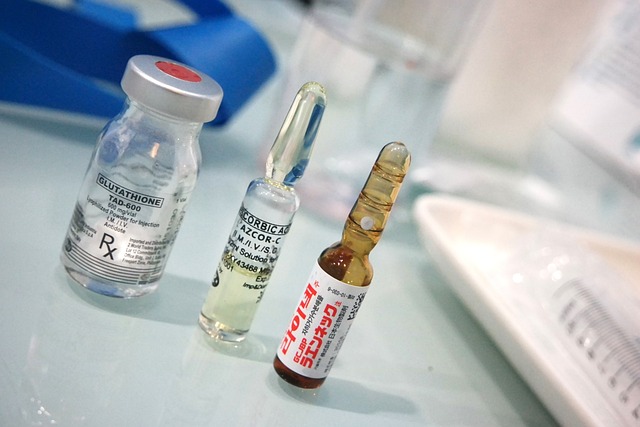The semaglutide injectable form is a leading treatment for type 2 diabetes, offering dual benefits of blood sugar control and weight loss. Its effectiveness is enhanced by strategic dietary adjustments and regular exercise. A holistic approach includes a balanced diet rich in fiber, lean proteins, and healthy fats, along with mindful eating practices and at least 150 minutes of moderate-intensity aerobic activity weekly, plus strength training. Professional guidance from dietitians and fitness experts can help individuals seamlessly integrate these components into their routines, leading to significant weight loss and improved health outcomes.
“Discover the power of a holistic approach to weight management with the integration of diet, exercise, and semaglutide injections. This comprehensive guide explores how understanding the semaglutide injectable form can revolutionize your journey. From unravelling the therapy’s mechanisms to creating tailored meal plans and incorporating effective exercise routines, this article provides insights for optimal results. Learn about the synergistic effects of these strategies, offering a sustainable path to achieving long-term health goals.”
Understanding Semaglutide Injectable Form: A Comprehensive Overview

Semaglutide, a type 2 diabetes medication, has gained recognition for its dual role in weight management. Its injectable form is a game-changer in healthcare, offering a comprehensive approach to treating metabolic disorders. This semaglutide injectable form works by mimicking the effects of a natural hormone, GLP-1, which stimulates insulin production and suppresses glucagon secretion, leading to improved blood sugar control.
The medication is administered via subcutaneous injections, allowing for sustained release into the bloodstream. This method ensures consistent levels of semaglutide, enhancing its effectiveness in managing both diabetes and promoting weight loss. Healthcare professionals often prescribe this treatment as part of a holistic plan, combining diet, exercise, and medication to achieve optimal results. Understanding the mechanics of the semaglutide injectable form is crucial for patients, as it enables them to actively participate in their healthcare journey and make informed decisions regarding their diet and exercise routines.
The Role of Diet in Semaglutide Therapy

In the context of semaglutide injections, a holistic approach to weight management includes not just regular administration of this innovative medication but also strategic dietary adjustments. The semaglutide injectable form mimics natural hunger-regulating hormones, making it more effective when paired with a balanced diet. By controlling calorie intake and focusing on nutrient-dense foods, individuals can enhance the benefits of semaglutide therapy. A diet rich in lean proteins, whole grains, fruits, and vegetables supports weight loss and improves overall health outcomes.
Additionally, mindful eating practices become even more crucial during semaglutide treatment. This involves recognizing hunger cues, enjoying meals without distractions, and stopping when satisfied—a skill that the right diet can refine. Combining these dietary strategies with regular exercise further optimizes the effects of semaglutide injections, fostering a sustainable and healthier lifestyle.
Exercise as a Complementary Tool for Weight Management with Semaglutide

Exercise, alongside a balanced diet, is a powerful complementary tool for weight management when combined with semaglutide injections. The semaglutide injectable form, known for its appetite-reducing effects, can be even more effective when paired with regular physical activity. Exercise helps to boost metabolism, burn calories, and increase muscle mass, all of which contribute to weight loss and maintenance. Studies show that individuals who incorporate both diet and exercise into their weight management plan often achieve better results than those relying solely on medication or dietary changes.
Additionally, combining semaglutide with exercise can lead to improved insulin sensitivity and reduced fat accumulation. The injectable form of semaglutide helps to regulate blood sugar levels, making it easier for the body to utilize glucose efficiently during physical activity. This synergy between exercise and semaglutide injections can result in enhanced weight management benefits, offering a holistic approach to achieving and maintaining a healthier body composition.
Optimizing Meal Plans for Maximum Semaglutide Effectiveness

When optimizing meal plans for those using the semaglutide injectable form, it’s crucial to focus on a balanced diet that supports weight management goals. Foods rich in fiber, lean proteins, and healthy fats should be the foundation of your meals. Fiber helps regulate digestion, promotes satiety, and ensures steady blood sugar levels, all of which enhance the effectiveness of semaglutide. Lean proteins provide essential amino acids while keeping hunger at bay, while healthy fats support hormone production and overall well-being.
Incorporating specific foods known to boost semaglutide’s action is also beneficial. For instance, protein-rich foods like eggs, poultry, and fish can enhance the appetite-reducing effects of semaglutide. Additionally, incorporating spices and herbs like cinnamon and black pepper may aid in blood sugar regulation. It’s essential to consult a healthcare professional or dietitian who specializes in this therapy for personalized meal plans that maximize the benefits of semaglutide injections while ensuring nutritional needs are met.
Incorporating Regular Physical Activity into Your Routine

Incorporating regular physical activity into your routine is a synergistic approach to managing weight and health, particularly when paired with semaglutide injections. This injectable form of diabetes medication not only aids in glucose control but also boosts feelings of fullness, making it easier to adopt healthier eating habits. Regular exercise complements these effects by increasing calorie burn, enhancing insulin sensitivity, and promoting overall fitness. Aim for at least 150 minutes of moderate-intensity or 75 minutes of vigorous-intensity aerobic activity each week, along with strength training exercises on two or more days per week.
Whether it’s brisk walking, cycling, swimming, or weight lifting, finding activities you enjoy increases the likelihood of making exercise a consistent part of your routine. Combining these physical activities with the right dietary choices—like those suggested by your healthcare provider or dietitian—can lead to significant weight loss and improved health outcomes. Remember, consistency is key; small, sustained changes often yield better long-term results than drastic measures.
Common Challenges and Strategies for Success

Many individuals face challenges when integrating semaglutide injections, diet, and exercise into their routine. Finding a balance between these components can be difficult, especially for those new to this approach. One common hurdle is adhering to a structured eating plan while adjusting to the semaglutide injectable form’s effects on hunger and satiety. People often experience varying levels of appetite suppression, which may make meal planning and portion control tricky.
To overcome these challenges, adopting a flexible yet consistent approach is key. Start by setting realistic goals and gradually incorporating changes. Consider working with a healthcare professional or dietitian who can provide personalized guidance on nutrition and exercise. Regularly tracking progress and adjusting plans as needed can foster success. Additionally, prioritizing self-care and staying motivated through support systems or accountability partners can make this journey more manageable.
Expert Insights: Long-term Benefits of Integrated Diet, Exercise, and Semaglutide

The combination of a balanced diet, regular exercise, and semaglutide injections has been a game-changer in managing weight and improving overall health. Experts emphasize that this integrated approach offers long-lasting benefits, going beyond short-term gains. By focusing on sustainable lifestyle changes, individuals can achieve and maintain a healthier weight, reduce the risk of chronic diseases, and improve their overall quality of life.
Semaglutide, in its injectable form, has been shown to aid in weight loss by mimicking the effects of natural hormones that regulate hunger. When combined with dietary adjustments and regular physical activity, this treatment can lead to significant and lasting results. Dietitians and fitness professionals play a crucial role in guiding patients through these changes, offering personalized plans that cater to individual needs and preferences. This holistic approach ensures that individuals not only lose weight but also develop healthier habits that they can maintain throughout their lives.
